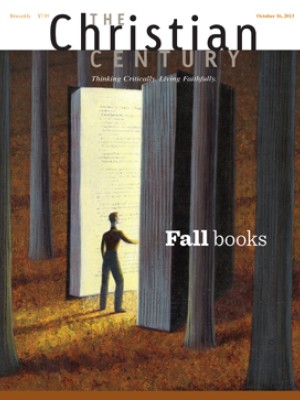Silence, by Diarmaid MacCulloch
Many years ago, the great historians of the French Annales school complained that scholars spend far too much time dealing with the elites and their wars and very little on the crucial matters of ordinary everyday life. Why, they asked, do we have no histories of death, of childhood, of old age? Today, of course, we have many such narratives. But Christian history still has a lot of room for such grand thematic questions, and Sir Diarmaid MacCulloch presents one in his history of silence. The book, which grows out of his 2012 Gifford Lectures, is a triumph. It challenges and will transform readers’ attitudes on a host of subjects that they may think they know well. Unusually for a work of scholarly history, it may also reshape readers’ spiritual and devotional lives.
The scale of MacCulloch’s ambition and the vastness of his topic are apparent from the titles of the book’s four main sections: “The Bible,” “The Triumph of Monastic Silence,” “Silence Through Three Reformations” and “Reaching Behind Noise in Christian History.” Unsurprisingly, he shows himself thoroughly accomplished in the scholarship of every era of Christian history, and his range of cultural references is deeply impressive.
Read our latest issue or browse back issues.
MacCulloch discusses the familiar topics of meditation and contemplation, but also such controversial aspects of silence as deception, dissimulation, discretion, secrecy, denial, concealment, cover-up and oblivion. Someone who urges you to “keep quiet about this” rarely means well. In a human interaction, your silence may signify awe and rapt contemplation, or it could indicate guilt or confusion. It might reveal stupor or wonder, but it can also make you look stupid. The word dumb has a complex history.
Attitudes toward such matters have changed radically over time. In the earlier biblical eras, prayer was assumed to be at least vocal, if not noisy; dumb was a severe condemnation applied to pagan idols. In the lovely story of Hannah, the priest Eli assumes that a woman praying silently and muttering to herself must be drunk. Over time, however, silence gained in esteem. By Jesus’ day, at least some Jews and Greeks were reimagining God as a transcendent power far beyond human reason or speech, making awed silence the appropriate response because the only true Word was God’s Logos. The Christian gnostic Valentinus placed the divine pair of depth and silence at the heart of the ultimate reality. Jesus commanded his disciples to keep silent about the messianic secret. Only after lengthy and acrimonious debate, however, did Christians grant the legitimacy of silent prayer.
MacCulloch’s dense account of ascetic and monastic traditions is especially rewarding. Through much of Christian history, churches have regularly preached the supreme value of remaining solitary and silent, denying family and sexuality. The second-century Gospel of Thomas reported Jesus as saying “Become passersby. . . . Blessed are the elect and solitary.” The word for solitary, monachos, would give rise to the term monk. Beginning in the Near East, the monastic movement spread over the Christian world, establishing bases that endured even when Islamic or barbarian conquerors ruled the surrounding countryside. Had the name not acquired other connotations, I would call them fortresses of solitude—and of silence. They ensured the survival of Christianity’s antifamily values.
MacCulloch’s history of monasticism allows him to bring out one of his favorite themes: the surprising interactions between the global church and other faiths. He suggests that Christian monks in Syria and Egypt drew inspiration from their Manichaean predecessors and neighbors, and beyond that perhaps even from Buddhists. He also notes the close resemblances between the Orthodox mystics devoted to silence or stillness (hesychia, hence the Hesychast movement) and the Islamic Sufis.
One of the book’s finest features is its generous coverage of all the major Christian traditions. The section on “Reformations” treats the great Orthodox movements and debates alongside Catholic monastic history and Devotio Moderna, and of course the Protestant Reformation. If you did not already know, you would never guess that MacCulloch began as a historian of the English Reformation, or that his first book covered Tudor rule in the English county of Suffolk. Obviously, given the present topic, he has plenty to say about the Radical Reformation too, including the Anabaptists and Quakers.
The final section, “Reaching Behind Noise in Christian History,” is a grab bag of seemingly unrelated materials. Some chapters work better than others, but the ones that work are truly insightful and provocative.
Particularly fine is his chapter on groups and individuals that have had to conceal their true beliefs in order to preserve their existence or their lives. Ironically, given his own theological leanings, he revives Calvin’s damning label of “Nicodemism” for such secret believers, after the Jewish leader who came to Jesus by night. But MacCulloch has immense sympathy for Nicodemites, whether they are secret Christian believers in the Europe of the Reformation or Counter-Reformation, or the Jews and Muslims who have notionally accepted Christian conversion. Christophe Plantin, an Antwerp printer for the regime of Spain’s King Philip II, for example, printed Catholic breviaries by day and propaganda for his own wildly heretical Familist sect by night. Plantin even printed the local edition of the Roman Index, which banned Familist books. The subject of Nicodemism leads to an account of covertly gay clergy, particularly in the Anglo-Catholic context.
MacCulloch then turns to “Things Not Remembered,” matters that have fallen into the silence of oblivion, whether because of guilt, shame or embarrassment. Because he addresses the topics so briefly, this section is suggestive rather than exhaustive. He touches, for instance, on the neglect and occasional suppression of women’s history in the churches and the persistent Christian silence over slavery. He also mentions the self-editing that marks spiritual memoirs, including those of such titans as John Wesley. Forgetfulness need not imply that forgotten actions are discreditable, however. I am still mulling over MacCulloch’s observation that “repeatedly, churches have built up their identity by forgetting things that it was no use remembering.” That cries out to be turned into an essay question: discuss.
His brief sketches do not do justice to some of the “guilty secrets” listed here. The brief account of the church’s record on clerical sexual abuse is fair enough, but the same cannot be said of his remarks about the alleged Christian silence on Nazi anti-Semitism and the Holocaust. Indeed, the two phenomena demand to be treated separately; anyone who claimed not to know about the first was lying or deluded, while the reality of the latter was highly controversial until the war’s very last stages. He is unfair to the Vatican of Pius XII, which labored silently and courageously to save many innocent lives.
So rich is this book that it is difficult to point out areas of significant neglect. But oddly, as far as I can see, MacCulloch never cites Shusaku Endo’s very well known novel Silence, a spiritual classic that addresses themes precisely related to MacCulloch’s concerns. The main character, Father Rodrigues, tries to understand how God can permit the horrors and persecutions he is witnessing in 17th-century Japan. Why is God silent? Does God not exist, or does God not care about God’s creatures? Or is there a higher purpose utterly incomprehensible to humanity? Endo’s book, moreover, focuses centrally on the dilemmas faced by secret believers, hidden Christians—in short, classic Nicodemites.
Obviously, these minor criticisms detract not at all from MacCulloch’s book’s immense value. No review can do justice to the legion of memorable stories and character sketches that appear on virtually every page. They add immensely to the book’s readability and make it readily accessible to a general audience, who will be able to read it through, then go back and dip in at leisure.
Now which brave soul will write the history of Christian noise?







